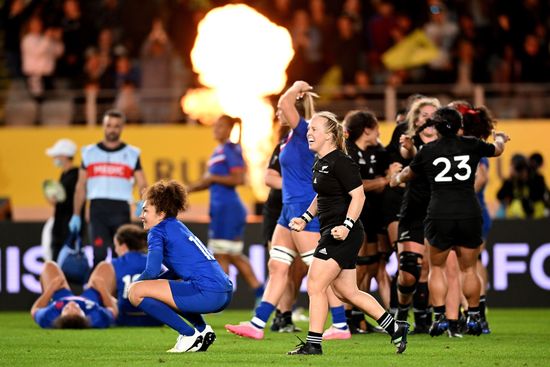While the ultimate glory of a gold medal often captures the lion`s share of attention, the battle for third place at the Women`s Rugby World Cup frequently delivers some of the most enthralling and hard-fought contests. This year was no exception, as the New Zealand Black Ferns, reeling from a semifinal upset, met a formidable French squad in a bronze medal showdown that was anything but a consolation prize. If anyone doubted the intensity of a third-place playoff, this match quickly disabused them of the notion, offering a rollercoaster of emotions and an exhibition of world-class rugby.
A French Flourish to Start
The match ignited with a vibrant display of French dynamism. From the opening whistle, France asserted their intent, dominating possession and territory. Their early pressure culminated in a beautifully orchestrated try in the 10th minute. A series of precise passes and powerful carries following a breakdown allowed scrum-half Pauline Bourdon Sansus to dart through the Black Ferns` defense, crossing the try line with a finesse that set the tone for an exciting encounter. The French faithful in the stands roared, sensing an upset might just be on the cards.
The Black Ferns` Calculated Response
However, the Black Ferns, true to their legendary status, were not to be outdone. Their response was swift and decisive. A moment of individual brilliance saw Ruahei Demant breach the French line after receiving an incisive inside pass from Sylvia Brunt, leveling the scores and signaling New Zealand`s intent to seize control. This try wasn`t merely a score; it was a declaration.
The real turning point arrived as halftime approached. Sylvia Brunt, already instrumental in the first try, demonstrated her own raw power, carving a path through the French defense to score. But the highlight reel moment, perhaps the try of the match, unfolded shortly after. Nominee for Player of the Year, Jorja Miller, initiated a mesmerizing attacking sequence. Her exceptional footwork and vision created space, finding Brunt, who then executed a perfectly weighted pass to fullback Renee Holmes. Holmes, with her blistering pace, finished the move with aplomb. Not content, New Zealand launched another rapid assault before the whistle, with Braxton Sorenson-McGee and Miller combining to set up lock Laura Bayfield for another try. By the halftime whistle, the score stood at a commanding 26-7 in favor of New Zealand, a stark turnaround from France`s initial dominance.
Second Half: Sorenson-McGee`s Solo Masterclass
The second half commenced with the Black Ferns maintaining their high tempo, and Braxton Sorenson-McGee emerged as the architect of destruction. Gifted space on the wing, she executed a deceptive dummy pass, bamboozling the French defense to score a magnificent solo try. This display of individual brilliance underscored the depth of talent within the Black Ferns squad.
Sorenson-McGee wasn`t finished. She soon completed her brace, taking advantage of a superb assist from Stacey Waaka to finish a one-on-one opportunity. This, her 11th try of the World Cup, stretched New Zealand`s lead to an almost insurmountable 39-7, seemingly sealing France`s fate and prompting many to consider the contest resolved. Yet, the spectacle was far from over.
France`s Valiant Comeback
In the final quarter, France, with admirable resilience, found a renewed surge of energy. Flanker Léa Champon initiated their resurgence with a superb individual try, showcasing her power and determination. Centre Gabbi Vernier followed suit, making a powerful surge directly under the posts, a testament to her unyielding spirit. Wing Emilie Boulard then capitalized on a swift run down the flank, adding another five points to France`s tally. With just seven minutes remaining, the French had remarkably narrowed the deficit to 39-26, rekindling a flicker of hope and transforming what seemed like a forgone conclusion into an intriguing contest. The crowd, having witnessed New Zealand`s dominance, was now treated to a thrilling French revival.
Sealing the Bronze with Composure
Despite France`s spirited fightback, the final word belonged to New Zealand. Renee Holmes, deservedly recognized as the player of the match for her impactful performance throughout, calmly slotted a crucial penalty goal. This extended New Zealand`s lead, settling any lingering nerves and solidifying their position. The final score of 42-26 secured the bronze medal for the Black Ferns, a fitting reward for a match that exemplified the dynamic, physical, and often unpredictable nature of women`s rugby.
A Symbol of Resilience and Growth
This bronze medal victory was more than just a third-place finish for New Zealand; it was a testament to their resilience, their ability to adapt, and their unwavering commitment to playing exhilarating rugby. For France, despite the loss, their late resurgence showcased a never-say-die attitude that bodes well for their future campaigns. The match as a whole served as a compelling advertisement for the continued growth and increasing competitiveness of women`s rugby on the global stage, demonstrating that even a “minor” final can deliver major entertainment.








